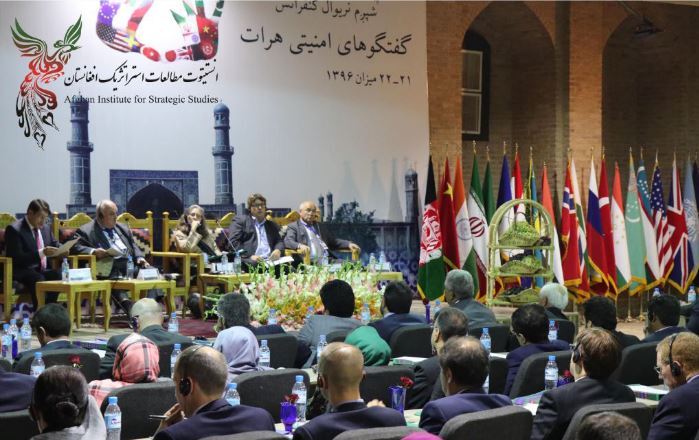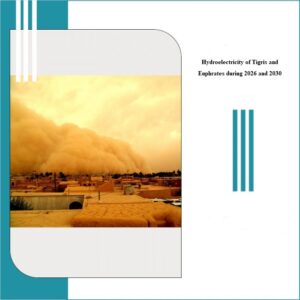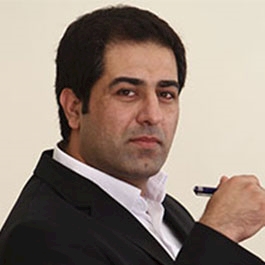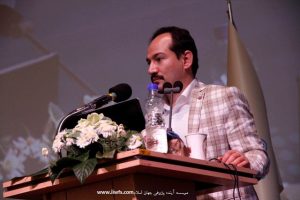The autopsy of governance in the Western Asia and its relevance to security
Speech by Dr. Seyed Hamze Safavi
Herat Security Conference October 14, 2017
Ladies and gentlemen! The region in which we are, namely, Western Asia, is the historical memory of human civilization, the cradle of Abrahamic religions, and an area with important geopolitical, geostrategic, geoculture and geo-economic features. Along with these important features mentioned, it is also unfortunate to note that for many years, the name of Western Asia has been accompanied by conflicts, extremism and terrorism, and the mental image created in this region in the minds of the world is a combination of insecurity and various dimensions of underdevelopment. I hope that the discussions in this conference and the consultation of the elite of the region can be a step forward in the path to better understanding the problems and finding solutions to the existing crises.
The subject of my speech is “the autopsy of governance in the region of Western Asia and its relevance to security.” The issues mentioned in the previous panels are a bit of a general state. I try to address the issue with the two previous panels, in the form of a case study of the West Asian region.
A question that has been in my mind for about 10 years is that this region, which is the cradle of the great civilizations of the world, is the cradle of the great scientists of the world, an area that has been the glory of mankind, so what in the last two or three centuries It has happened to it that its situation is so devastating and full of war, violence and insecurity, instability and lack of development. Various answers have been given. A number of thinkers believe that the region is lagging behind the advanced countries due to wars in the area; this seems to be a mistake; because Europe has been in constant conflict since the seventeenth century until 1946 and at the same time it has been developing alongside the war. So the war that exists in the region, I believe, is not the cause of our retardation.
Another group poses the lack of nationalism and believes that nationalism has not been formed in this region. It seems that the issue of nationalism does not necessarily lead to further development. As in the First and Second World Wars, nationalism and excess of it led to the global catastrophe.
Some raise the subject of religion. They say that Europe has made progress because it has abandoned religion, but here [Western Asia] has not made progress because it has not abandoned religion. I also disagree with this. My opposition is based on the available data. You might know that The U.S. is a more religious community than the European community today. If you analyze the words of George W. Bush, you see that there are religious sparkles in it. The American community is a religious community. If religion was an impediment to development of nations, then The U.S. would have been more undeveloped than Europe. A particular perception of religion or the imposition of a particular type of religion on others may had led to this. But the religion’s soul depends on how you interpret it.
So what is missing in this area? The discussion that I want to put forward is intensive. It is a long discussion that I will summarize very briefly.
1. The lack of consensus definitions between elites and elites with people in Western Asian societies
We do not know exactly what we are looking for; we have few common ideas with each other. Our elites do not have a mutual understanding. For your mood to change, I’ll read a verse (poetry); in the story of Layla and Majnun, one of the masterpieces of Persian literature, people ask Majnun: Why do you love Lily while being ugly? Majnun replies:
“The one you call her Layla is not that Layla, who has taken solace from me.”
What does it mean? This means that my look is very different from yours. You may consider the apparent beauty, but I love someone who has spiritual qualities. We disagree with the definition of the ideal. In the Middle East, common concepts are not yet formed. “ The term“ is common but “concepts“ are not. But it’s well-formed in the West. Before the French Revolution of 1789, you see intellectuals were approaching the terms and concepts and, with the French Revolution, this process got closer to maturity in the field of society and politics.
2. Indicator making and transforming quality matters into quantitative matters
We have problems with this issue in humanities in the region. We have not yet been able to make accurate Indicators so that we can see where we are and where we want to go. We cannot hope for systematic improvement of decision making processes until the Indicator making is done and the criteria and scales for measuring performance are formulated and implemented.
3. Prioritization
Our elites in this region generally have a problem with what priorities are. Is religion a priority now? Is it the livelihood of the people? Is it economy? Is it security…? Or what?
This discussion has certain definitions that are respected. A list of priorities can be made and based on that, you have a comprehensive plan for action.
But what is the proposal? To solve the big issues, you have to partition them and begin to work out according to priorities.
In my opinion, the compass of the movement for the elites of the region should be permanent development in the context of regional cooperation, and other matters will be measured and relativized using this issue. According to the category I spoke about at the beginning, the notion of permanent development in the context of regional cooperation should be defined accurately and there should be consensus on it between government and academic elites. In the next step, this will be prioritized and will be the guide of the remaining act patterns.
The next step is the need for Indicator making to do evaluating and monitoring. In this step, I think we should use world experience. In the Qur’an, Allah says in a verse to believers about the characteristics of believers:
“یستمعون القول و یتبعون احسنه”[i]،
“Muslim and believer is the one who hears the different people and chooses the best.”
The concept I want to choose is the concept of Good Governance, which has been used by the international institutions as a prescription for this region over the last two decades.
This concept has been abundantly used in the literature of development in recent years. The notion of Good Governance, with the reforms that are needed in our region, is a prescription that can make an important contribution to the progress of this region. It should be noted that good governance simply does not mean making good decisions, but it is to reach the best possible decision making process. Good governance expresses eight indicators for governments; what I said earlier that we do not have Indicator making to evaluate countries with these eight indicators to determine where we stand. These 8 indicators include participation, rule of law, transparency, answerability, the formation of public consensus, public rights (justice) – something that is the concern of the honorable head of panel; of course, justice between women and men in the region is a problem and must be addressed. – Effectiveness and efficiency and the eighth is responsibility. I heard these 8 indicators as indicators that could be useful for this region, but considerations should be followed. Many of prescriptions which World Bank scribbled for world had reverse outcome; because they were not suitable for the needs of countries. Therefore, in my opinion, for the use of these global indicators in our region, we should add two considerations to them; one is the attention to the traditional characteristics of tribes and the second is the religious considerations of the people. If these two conditions are not met, any plan will face challenges. The total of these eight indicators should be on a single scale.
What is its relation to security?
Security in West Asia faces many difficulties due to the existence and impact of numerous elements and actors, and their conflicting material and spiritual interests which for many experts, the security conundrum in this area has a kind of blind knot of various layers. We believe that it is not impossible to achieve security, but to provide solutions for moving to a Stable security, we must have a functional division of the layers affecting the insecurity of this region.
The security problems of this region are two main categories: The first bunch of problems has been due to numerous foreign interventions for various excuses from the past, which unfortunately, these interventions have brought irreparable harm to the region from a wide range of political, social, and cultural and… dimensions. I do not want to talk much about it, and only briefly I have to say that trans-national schemes and patterns in the Western Asian have not only been ineffective, but they have been the source of crises and new problems in the region. In fact, what we are seeing today is the competition of regional and trans-national powers over interests, the spread of terrorism, violence and insecurity, the transformation of the region into weapons warehouses, and the complexion of security knots which sometimes occurs in the form of conflict or crisis in a corner of the region.
The second group of problems in this region is its internal problems, which itself consists of three categories of crises. The first category is the fundamental crises, such as the crisis of water and…. The second category is the crisis caused by the general culture of nations, and ultimately the third category is the crisis caused by the structure and functioning of the state. Governments in this area are often patrimonial tribal governments, which, due to their nature and the lack of legitimacy of the people, are typically authoritarian and dependent on foreign powers. Other features of the government in this region include rentier economies and oil-dependent states, rental security, and the bureaucratic corruption and inefficiency of many governments.
One way to mitigate the negative effects of government-led crises is to move towards good governance indicators. I believe that if these eight indicators, along with those two considerations are seen below the concept of Stable development, the concept of the weak government that was said in the previous panel is not formed, and governments will be powerful. Therefore, foreign intervention cannot succeed here. Security should be seen as a subset of development. Of course, many experts believe that development should be seen as a subset of security. But I believe that if governments are to develop, and that their commitment and directional lights are Stable development, they will have a wider look at security, and their policy-making will lead to more security.
Therefore, it is necessary for the elites to come together and collaborate on defining the model of Stable development in the context of regional cooperation and bringing the definitions closer together. Then, the redefinition of the role and place of the region in the international system should be considered and a new model of cooperation with the international system in the region should form on the interests of all actors. To achieve this success, once again we go back and ask ourselves some questions! How are our decision makers chosen and appointed on the basis of which indicators and methods? The policies of the rulers – which influence the lives of the people of this region – by what mechanism are monitored and evaluated? To what extent is transparency in the system of governance of countries? How responsible and accountable are decision makers? And the other questions that each of them can indicate the amount of our movement toward good governance. Good governance is a necessary platform for Stable regional development and security.
Thank you very much for your attention.
** This article is originally published in Persian and translated by A.R. Mirjomehri.





